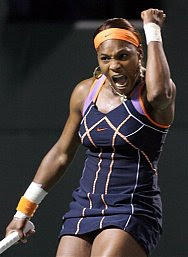 George Bush's Reality Check
George Bush's Reality CheckEX-AIDE IN W'S INNER CIRCLE TAKES HIM TO THE WOODSHED.
Read the important article here.
This was overdue. Waaaay overdue!
We thought it was just us.
 George Bush's Reality Check
George Bush's Reality Check
 America's Mayor Has Surged, But Are WE Sold?
America's Mayor Has Surged, But Are WE Sold? 
 No Surprise Here: Jesse Jackson Endorses Barak Obama For President
No Surprise Here: Jesse Jackson Endorses Barak Obama For President WE KNEW SHE WAS TOO GOOD TO BE TRUE
WE KNEW SHE WAS TOO GOOD TO BE TRUE On the heels of the distracting taunts of an alleged racist heckler earlier in the week, Serena Williams has advanced on to compete in the finals of the Sony Ericsson Open anyway.
On the heels of the distracting taunts of an alleged racist heckler earlier in the week, Serena Williams has advanced on to compete in the finals of the Sony Ericsson Open anyway.  Scheduled for a 2009 release, "The Frog Princess" will feature Maddy, its first African American animated princess in its 84 year history.
Scheduled for a 2009 release, "The Frog Princess" will feature Maddy, its first African American animated princess in its 84 year history.  Larry Wilmore, creator of the recently canceled Fox program, The Bernie Mac Show, is not just tickling our funny bone.
Larry Wilmore, creator of the recently canceled Fox program, The Bernie Mac Show, is not just tickling our funny bone.
 Cohort Paul Mooney, Chappelle Team For BET Pilot Called "Judge Mooney"
Cohort Paul Mooney, Chappelle Team For BET Pilot Called "Judge Mooney" 
Some White Guys Know How To Bust A Move
The President and Karl Rove - Ahhh, No!
Also, check out Bush and his political guru gettin' jiggy with it here.

 60 Years Coming, Tuskegee Airmen are Finally Honored
60 Years Coming, Tuskegee Airmen are Finally Honored  Say Bye-Bye Analogue TV
Say Bye-Bye Analogue TV  How the U.S. Continuously Engages in Inconsistent Treatment of Haitians vs. Cubans.
How the U.S. Continuously Engages in Inconsistent Treatment of Haitians vs. Cubans.  Heckler Causes Serena Williams To Have Him Thrown Out
Heckler Causes Serena Williams To Have Him Thrown Out Legendary Hip Hop Mogul Suge Knight
Legendary Hip Hop Mogul Suge Knight 


Could it be that America is on the front end of a tail wind for a national apology for slavery?

 We're Not All In Agreement On This But Trust Me, It’s Coming.
We're Not All In Agreement On This But Trust Me, It’s Coming. I'm Fixing My House To Sell
I'm Fixing My House To Sell
THIS WILL COME AS NO SURPRISE TO MANY
WE SUSPECTED IT ALONG
ENOUGH SUSPENSE...
ARE YOU READY???
With the war in Iraq, the Darfur crisis, and everybody strapped and packin' in Katrina, you conscious brothers and sisters will at least skim these stories. (just click Iraq, Darfur, or Katrina)
The rest of you triffling folks can get the latest on the Anna Nicole Smith saga by clicking here
April Fools Comes Early - No Need To Thank Us!


 In Schools, It's The Principal Of The Thing. click here
In Schools, It's The Principal Of The Thing. click here
LET'S NOT FALL FOR THIS WAR OF THE COLOREDS
For more than 20 years, Black and Brown population numbers have been steadily rising while the numbers for white folks have stayed stagnant. For the insecure money-hungry power elite who don’t look like us nor like the notion of us outnumbering them, this can be scary.
This is why Katrina, border insecurity and deep-seeded poverty are allowed to happen in the richest, country in the world.
Having said that, we can't keep blaming white people. Been there, done that!
What we can do is come together, organize and take control. The energy we're putting into fighting each other should go into getting to the polls on Election Day in numbers that matter, demanding better schools, and creating our own economic opportunities.
Need an example of what we're talking about - click here
HEY YOU ILLEGALS: LA CUCHA GOTCHA
NEWARK — Craig Carton and Ray Rossi, hosts of an afternoon radio show called "The Jersey Guys", think teasing Asians with sing-song Chinese accents is hilarious. Mental illness - hysterical.
Recently the outrageous pair kicked off “Operation Rat a Rat/La Cucha Gotcha,” a listener-participation game set to mariachi music that encourages people to turn in friends, neighbors and “anyone suspicious” to immigration authorities.
With 15 percent of New Jersey's population identified as being Hispanic, reaction to the show in the garden state has not exactly been positive... with Latinos that is.
At a news conference Thursday, Hispanic elected officials and others were pissed, calling the campaign a “publicity stunt” that could incite violence against Hispanics.
Anyone expecting an apology or an immediate end to Rat a Rat, however, will be sorely disappointed. The cockroach campaign, at least for now, is not slated to end until May 5th, aka Cinco de Mayo.
Tequila!


 FILM REVIEW: "PRIDE" (view trailer)
FILM REVIEW: "PRIDE" (view trailer)
